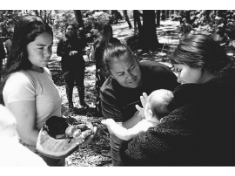-
Reviving Culture Through First Nations Midwifery
March 5, 2021 By Hannah Chosid “It’s more than just clinical care. It’s cultural. It’s connection to country. It’s connection to land. It’s all of those things that are important to the woman and family, kinship, babies,” says Mel Briggs, a First Nations midwife in Australia, speaking about the importance of Aboriginal midwifery in this week’s Friday Podcast. Like her great-grandmother, Briggs followed the call to midwifery and finds joy in helping women and families “create really healthy, chunky, fat babies.”
“It’s more than just clinical care. It’s cultural. It’s connection to country. It’s connection to land. It’s all of those things that are important to the woman and family, kinship, babies,” says Mel Briggs, a First Nations midwife in Australia, speaking about the importance of Aboriginal midwifery in this week’s Friday Podcast. Like her great-grandmother, Briggs followed the call to midwifery and finds joy in helping women and families “create really healthy, chunky, fat babies.”“It’s more than just clinical care. It’s cultural. It’s connection to country. It’s connection to land. It’s all of those things that are important to the woman and family, kinship, babies,” says Mel Briggs, a First Nations midwife in Australia, speaking about the importance of Aboriginal midwifery in this week’s Friday Podcast. Like her great-grandmother, Briggs followed the call to midwifery and finds joy in helping women and families “create really healthy, chunky, fat babies.”
“First Nations people of Australia hold the oldest bloodline and the oldest living culture on the planet,” says Briggs. Their midwifery practices existed long before colonization, but due to colonization, Aboriginal models of care were “taken away from us” in favor of Western medical models, she says. Australia is currently home to 30,000 dual registered nurse-midwives, but only 300 identify as Aboriginal.
A history of colonization has impacted birth practices and led to poor health outcomes in First Nations communities. For example, the introduction of Western foods into Aboriginal communities has led to high rates of chronic diseases, like obesity. Chronic illnesses affect maternal health and often lead to pregnancies being considered high-risk. For Briggs, this means the women she supports don’t have the option to birth at home and must birth in a hospital setting. “When you look at the medical model, it’s not the woman’s fault that these things have happened to them. It’s the society and it’s the models that have done this,” says Briggs. Older generations of Aboriginal people “hunted and they gathered and they were healthy and fit… let’s go back to that. Let’s just do that… and then the next generation, we’ll have a generation of those women who will be able to birth at home and be healthy and well.”
Since many First Nations women give birth in hospitals, Briggs supports birthing mothers in cultural practices before and after they go to deliver. “When we’re in that space, the women are actually healing, so that they can birth peacefully and calmly. And that gives them strength going into a place where they’re going to be controlled,” says Briggs.
Briggs recalled a recent hospital birth experience that respectfully bridged the gap between the medical model and First Nations traditional practices. The birthing woman, who Briggs described as “strong in her culture,” told the hospital staff that when her baby was born, she didn’t want them to speak. She stressed the importance of her child’s first heard word being in her language and when her baby was born, she and Briggs said “Walawaani,” which means ‘I hope you had a safe journey.’ “It was like a big celebration,” says Briggs. “Everybody just started crying.” It was nice to include the hospital staff in Aboriginal traditions, says Briggs. “Even though we needed to use an obstetric medical, clinical intervention, it was still respecting culture. And that’s what needs to happen.”
Bringing healthy babies into the world and supporting women on their motherhood journey will allow her community to “grow and thrive,” says Briggs. “It’s taken a very long time, 230 years, in fact. We’ve been controlled and oppressed for a very long time. I just feel like, It’s time. It’s time for our people to thrive, and to be equal.”
Read More:
- Māori Midwives Camille Harris and Waimarie Onekawa are returning to traditional midwifery practices in New Zealand
- In New Mexico, Navajo midwife Nicolle Gonzales helps Native American women thrive.
- Indigenous midwives benefit Indigenous women and improve health outcomes.
Friday Podcasts are also available for download on iTunes and Google Podcasts.
This podcast series on Indigenous midwifery has been made possible by the generous support of the International Confederation of Midwives (ICM) and UNFPA.
Sources: Contemporary Nurse, HealthTimes, March of Dimes, Vimeo
Photo Credit: Midwife Mel Briggs working with new mom and baby in New South Wales, Australia. Photo by Jerusha Sutton, used with permission courtesy of Mel Briggs.
 A Publication of the Stimson Center.
A Publication of the Stimson Center.

 “It’s more than just clinical care. It’s cultural. It’s connection to country. It’s connection to land. It’s all of those things that are important to the woman and family, kinship, babies,” says Mel Briggs, a First Nations midwife in Australia, speaking about
“It’s more than just clinical care. It’s cultural. It’s connection to country. It’s connection to land. It’s all of those things that are important to the woman and family, kinship, babies,” says Mel Briggs, a First Nations midwife in Australia, speaking about 

